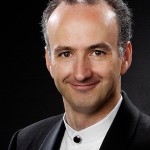Poignant, sacred beauty with Ars Nova and guest artist Edward Dusinberre
A review by Ruth L. Carver
Ars Nova Singers paired their usual adventurous programming with a special guest on February 8 at Macky Auditorium. They were joined by Edward Dusinberre, the first violinist of the Takács Quartet, in a program entitled “Passion: The Violin and the Voice.” The program mixed a group of sacred text settings featuring violin with David Lang’s Pulitzer Prize-winning the little match girl passion. Artistic Director and Conductor Thomas Edward Morgan has made sure his group is on the forefront of bringing new choral music to Colorado audiences, and this effort is all the more impressive given the longevity of the organization (now in its 28th season). Here the professional-core choir gave fine readings of several new works, and the program offered the rare chance to hear Dusinberre on his own.
Soprano Amanda Balestrieri also joined the group for the first half, opening the evening with a chant by 12th-century nun Hildegard von Bingen, Ave Maria, O Auctrix Vitae. KJ Troy on cello and Ann Marie Morgan on gamba provided an ethereal drone, upping the tempo of their bowing as Balestrieri’s vocal lines increased in intensity. Balestrieri’s creamy, warm middle voice perfectly carried von Bingen’s passionate text, and her well-executed rhythmic motives kept the flow of the meandering chant going. This throwback to the early days of sacred music was a fascinating contrast to the remainder of the program, all composed within the last 30 years. Knut Nystedt’s Ave Maria followed, and this curious piece for mixed choir and violin meandered less successfully through the classic prayer to the Virgin Mary. While the choir’s part was filled with atonalism and tone clusters, Dusinberre’s violin part was of a more neo-Romantic cast, which didn’t seem to relate to the choir’s text setting at all. Dusinberre played passionately, and this dark and somewhat desperate Ave Maria came to a final rest in a beautiful cadence.
Rudi Tas’ Salve Regina showcased the choir’s strong tenor and bass sections, and a trio of soloists from within the choir, along with Balestrieri and Dusinberre, made this U.S. premiere a lovely addition to the program. Here the violin seamlessly interplayed with the humming and exuberant choral parts. All of the soloists executed their parts with ease and lively power. Before the world premiere Paul Fowler’s Calling, the conductor lead the audience through a brief tutorial in overtone singing, in which the singer manipulates the shape of their vocal tract in order to emphasize the overtone series and create some unusual sonic effects. Fowler (who also sings in the choir’s tenor section) utilized this technique as well as some blowing sounds and drones to create this oddly transporting and wordless piece. The choir was obviously enjoying themselves, as they slapped their chests, chanted “hey-ho,” and the audience thoroughly enjoyed this display of extended vocal techniques. The first half closed with Reed Criddle’s Pietà, a plaintive and gorgeous piece inspired by Michaelangelo’s famous sculpture. Dusinberre played his part eloquently, moving in tandem with the choir at times, and adding an intense vibrato to this richly harmonized setting.
Dusinberre, alone on stage, opened the second half with an incredible rendition of the Chaconne from J.S. Bach’s Partita no. 2 in d minor. It was the sort of time-stopping, breathtaking experience every audience member looks for. Dusinberre mentioned he found it to be “the greatest piece ever written for solo violin,” and he played it with all of the beauty, precision, and penetrating harmonic exploration Bach deserves. Lit in a pale blue silvery spotlight, Dusinberre’s rendition of this classic was magical.
The lighting effects continued throughout the evening and added an appropriately theatrical element to David Lang’s the little match girl passion. Lang wrote the lyrics himself, appropriating the Hans Christian Andersen story and parts of Bach’s St. Matthew Passion. He takes the morbid children’s story and raises the stakes, making the girl a martyr and the crowd of bystanders a Greek chorus of sorts. Lang’s music style shares elements with other established minimalist composers, and he often repeats short melodic and rhythmic motives so that they become tattoo-like. The stark repetition of one upward scale appears in several of the fifteen movements and colors this sad story with a bleak, desolate musical voice. Ars Nova sang with generally excellent diction in telling the tale of the poor little match girl, alone in the freezing night, who slowly dies after failing to sell any matches. In striving for rhythmic precision, some of the resonant beauty of the choral sound was lost, but the choir gave a really lovely reading of this poignant work. The final movements, including “When it is time for me to go” with its flickering, shivering effects, and “In the dawn of morning” with its dramatic pauses and melancholy solo (sung by Paul Fowler), were especially moving. Percussionist Eric Harbeson effectively added eerie and ominous effects throughout. At the close of the piece, the lights dimmed and Dusinberre reemerged, offering the Sarabande from Bach’s Partita no. 2 in d minor. The bookending of Lang’s work with Bach’s made the allusions to the St. Matthew Passion all the more clear, and the violin gave the Little Match Girl a stately, wordless, and unearthly voice.
Ars Nova has been a vanguard of new music in Colorado. Their hard work is being seen in more and more performances by other groups throughout the metro area. Works like Lang’s deserve to be heard, and in partnerships with fine soloists like Dusinberre and Balestrieri, audience and musicians alike benefit. This program was on the long side, but it explored works rarely heard, and brought an important, fresh sound to the standard sacred choral repertoire.










